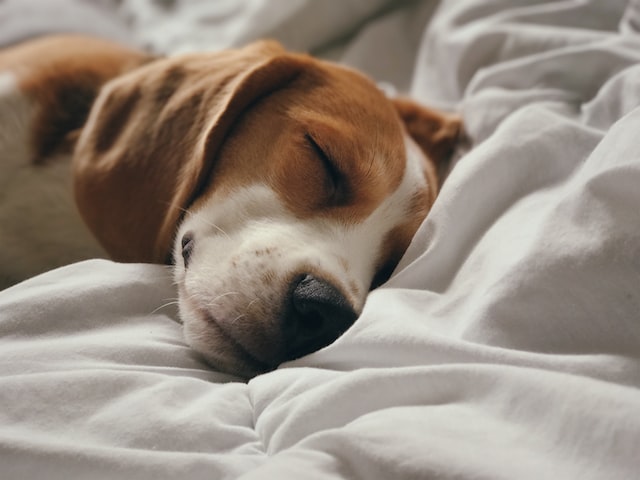Do you have a new puppy that seems to never want to go to sleep? Or maybe an older dog that seems to sleep most of the day (and night) away? Either of these instances can understandably be a cause of worry for the pet’s owner because, well, we tend to worry a lot about our furry family members.
However, it is important to understand that a dog’s life is vastly different than our own. While we humans need several continuous hours of sleep per night just to operate the next day, dogs don’t.
If you’re wondering – how long should a dog sleep?, then this post should hopefully provide you with some answers.
Sleeping Habits of Puppies
There haven’t been a lot of studies done on the sleeping requirements of puppies, but according to one report published by the National Center for Biotechnology Information, puppies up to 12 months old should sleep at least 11 hours a day.
If it seems like your puppy isn’t sleeping through the night, it’s probably because she isn’t. The reason is because most puppies tend to sleep less at night than adult dogs do. Instead, puppies prefer to sleep more hours during the day.
Sleeping Habits of Adult Dogs
A healthy adult dog will usually sleep anywhere between eight and 13.5 hours per day. Most adult dogs sleep between 60% and 80% of the hours between 8 p.m. and 8 a.m. Ultimately, the length of time they spend sleeping at night all depends on their surroundings and their owner’s schedule. Despite sleeping through the night, most adult dogs will also take advantage of daytime naps, with some sleeping as much as 37% of the day away.
Sleeping Habits of Elderly Dogs
If you have a senior dog, then odds are she will usually be napping any time you look at her. The reason is because elderly dogs don’t wake up as frequently during the night and they usually don’t get up as early in the morning as younger dogs. They also take more frequent naps during the day.
Can Dogs Have Sleep Disorders?
Like humans, dogs can suffer from sleep disorders that can negatively affect their health and wellness. The most common sleep disorders diagnosed in dogs include:
- Canine narcolepsy
- Obstructive sleep apnea
- Rapid eye movement (REM) sleep behavior disorder
If your dog is diagnosed with any of these conditions, then her veterinarian will provide you with treatment options that should improve the quality and duration of your dog’s sleep.
How to Help Your Dog Get the Right Amount of Sleep
Most dogs don’t have a problem getting enough sleep, but if you notice that your dog isn’t, then there are some things you can do to help improve her sleeping habits. One of the most important things you can do is to follow a daily routine. Keeping to a routine will allow your dog to anticipate what will happen and when, and this will help her rest more easily.
Providing your dog with a comfortable sleeping space that is quiet and dark is also important. This will allow her natural circadian rhythm to work. You should also make sure she is getting adequate exercise during the day. Exercise helps burn off extra energy and makes it easier for your dog to relax. This is especially important for high-energy or working breeds.
If you work from home, then it is important to allow your dog to have extended periods during the day without activities or distractions, so she can take naps whenever she needs them.
Lastly, if you share your bed with your dog, and your dog (or you) isn’t sleeping at night, then you may want to provide her with her own dedicated sleeping space, so the two of you can sleep with fewer disturbances.

